As more and more states legalize marijuana, use of this drug has become more common and more socially palatable than in years past. Many people may falsely assume that because a substance has been made legal, it is completely safe. Unfortunately, frequently consuming high-potency marijuana carries several troubling health risks. Perhaps the most concerning is an increased risk of experiencing psychosis.
What is Psychosis?
Put simply, psychosis is a break with reality. It is characterized by disruptions to someone’s thoughts and perceptions which prohibit them from telling the difference between what is real and what is not. These disruptions can take the form of seeing, hearing, or believing things that aren’t real – these are called hallucinations. Psychosis can also involve delusions: strange, persistent thoughts that are not rooted in reality. It is a symptom, not a disorder in and of itself.
While no two psychotic episodes are exactly alike, it is universally accepted to be disorienting at best and extremely frightening at worst. As many as 3 in 100 people will experience one of these episodes at some point in their lives.
Early psychosis, also called first-episode psychosis, rarely materializes out of the blue. Usually there will be warning signs before someone’s first psychotic episode; these should serve as incentive to see a doctor before things get worse. These warning signs may include…
- Difficulty concentrating
- Worsened performance at work or school
- Paranoia or uneasiness with others
- Poor personal hygiene
- Social isolation
- Strong, inappropriate feelings or exhibiting no emotions at all
A psychotic episode itself is characterized by…
- Hearing voices or other things that others cannot
- Seeing things that are not there (distorted shapes or people)
- Otherwise perceiving things that others cannot (smells, tastes)
- Unshakable, repetitive, intrusive thoughts
- Believing that external forces are controlling one’s feelings, thoughts, or behaviors
- Believing that trivial happenings are “signs” or otherwise have great importance
- Believing one has special powers or even that one is divine or “chosen”
Experiencing psychosis can be an extremely unsettling event in one’s life. However, this issue is not one that develops overnight. It can be catalyzed by outside factors, one of which is ongoing substance use.
Does Marijuana Cause Psychotic Episodes?
High-potency cannabis is defined as a product containing more than ten percent tetrahydrocannabinol (THC), the compound that creates the drug’s psychoactive effects. It may take the form of marijuana, synthetic marijuana, or marijuana wax products. Today, these substances are much more common on the market than in years past.
In a recent report from the National Academies of Sciences, Engineering and Medicine, researchers caution that heavy marijuana use, prolonged exposure to the drug, and age of first use can all contribute to the triggering of initial psychotic episodes. If there is a pre-existing mental illness, especially schizophrenia, marijuana use may worsen symptoms significantly.
This is not the first study to assert that marijuana and psychosis have a complex relationship; further research has indicated that young people who are predisposed to developing a psychotic illness may begin using marijuana at a younger age than their peers.
Developing a psychotic illness results from a coalescence of several factors, not just one experimental episode with marijuana, says Dr. Michael Birnbaum, child and adolescent psychologist. One key factor, heavy and prolonged use of marijuana, has been linked definitively to psychosis. Use of this drug can lead to an earlier onset of psychotic symptoms or the development of illness in otherwise healthy people – “meaning it is possible that psychosis would not have developed in that person if they had never smoked pot,” Dr. Birnbaum confirms.
What Should Parents Do?
The best approach for parents to take is to create an atmosphere of open, honest communication. Speaking candidly with one another will allow you to educate your child on the risks of marijuana use. It will also enable your child to feel safe informing you of any psychotic episodes, substance use, or other concerns they may have.
If your child has begun experiencing psychosis as a result of frequent marijuana use, there is hope. Pine Grove offers comprehensive treatment programs for people of all ages, from adolescence to late adulthood. To learn more about our services, call 1-888-574-4673 today.

